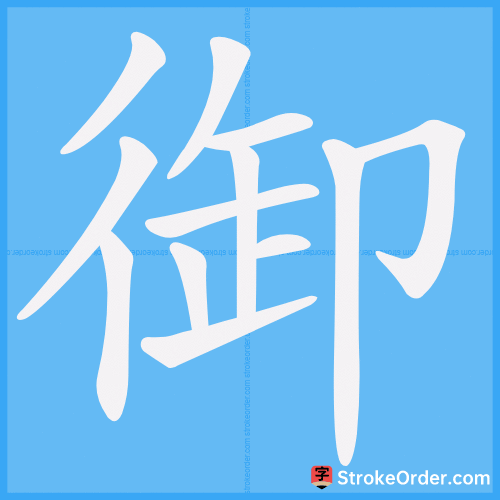御 Stroke Order
Animated Stroke Order of 御

Stroke Order Diagrams for 御

Step-by-Step Handwriting Guide for 御

Learn to Write Chinese Characters with Video Tutorials
Watch the video of writing the Chinese character "御", learn the correct stroke order (笔顺) of the character "御", and master the standard way of writing the character "御".
Free Printable Handwriting Practice with Stroke Order: 御
Printable Writing Practice Worksheet of "御" in Portrait Orientation (Tian Zi Ge)

Printable Writing Practice Worksheet of "御" in Landscape Orientation (Tian Zi Ge)

Information of 御
Pinyin
yù
Radical
彳
Strokes
12 strokes
Usage
★★★★★
Definition
defend / imperial / to drive, defend / resist
御: [yù]
1. 驾驶车马。
(Drive a carriage or horse.)
2. 封建社会指上级对下级的治理,统治。
(In feudal society, it refers to a superior ruling over a subordinate.)
3. 对帝王所作所为及所用物的敬称。
(A respectful term for the actions and items of the emperor.)
4. 抵挡。
(To resist.)
5. 驾驶车马:~车。~者。
(Driving a carriage: ~ car. ~ driver.)
6. 封建社会指上级对下级的治理,统治:“百官~事”。~下。~众。
(In feudal society, it refers to the governance and rulership over subordinates: "Officials govern their matters." Govern the subordinates. Rule over the masses.)
7. 对帝王所作所为及所用物的敬称:~用。~览。~旨。~赐。~驾亲征。
(Respectful terms for the emperor’s actions and belongings: ~ use. ~ viewing. ~ edict. ~ bestowal. ~ the emperor personally leads.)
8. 抵挡:防~。~敌。~寒。
(To resist: prevent ~. Resist the enemy. Resist the cold.)
9. 同本义。也作“驭”。
(Same original meaning. Also written as "驭".)
10. 后亦泛指驾驭一切运行或飞行之物。
(Later generalized to refer to controlling all moving or flying items.)
11. 统治;治理。
(To rule; administer.)
12. 控制;约束以为己用。
(To control; restrain for one's own use.)
13. 统率;率领。
(To command; lead.)
14. 使用;应用。
(To use; apply.)
15. 载,装运。
(To charge; transport.)
16. 违逆。
(To run counter to.)
17. 皇帝驾临。
(The emperor's arrival.)
18. 指侍奉皇帝的妃嫔。
(Refers to the concubines serving the emperor.)
19. 驾驶车马的人。
(Driver of a carriage or horse.)
20. 车和马。
(Carriage and horse.)
21. 仆役,侍从,陪伴主人提供服务的人。
(Attendant, servant, someone who accompanies and serves the master.)
22. 宫中女官名。
(Name for a female official in the palace.)
23. 对帝王所作所为及所用物的敬称。
(Respectful term for the emperor’s actions and items.)
24. 宫禁。
(Imperial court.)
25. 息止;禁止;阻止。
(To stop; prohibit; hinder.)
26. 抵御。
(To defend or resist.)
27. 迎接。
(To receive.)
28. 引自诗经和楚辞的解释,说明“御”有迎接的意思。
(Cited explanation from the Book of Songs and Chuci, indicating that "御" also means to welcome.)
Input Method for 御
Pinyin
yu4
Wubi
trhb|ttgb
Cangjie
hooml
Zhengma
oiiy
Four Corner
27220
Unicode
U+5fa1
Same Pronunciation Characters